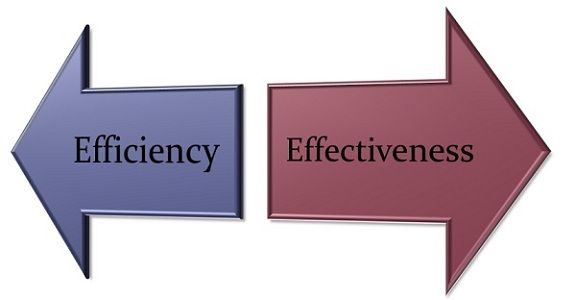A Time Management Article by Harold Taylor
For example, developing life goals, plans, policies, and mission statements are all effective strategies. Reducing interruptions or improving e-mail and streamlining meetings are aimed at being more efficient. Similarly, personal values, career choices and life balance are all effective. Office organization, file management and the use of technology are aimed at increasing efficiency.
Effectiveness may involve having a vision or mission, goals compatible with that vision, and a plan of action to achieve those goals or objectives. But efficiency is necessary to carry out the step-by-step action plan in the most economical, expedient way with a resultant quality consistent with the goal. A goal and a plan are useless if the job never gets done. Efficiency cuts through procrastination, perfectionism, and inertia, and converts a plan into action. Efficiency minimizes delays, interruptions, distractions and ensures that the desired results are obtained.
Efficiency and effectiveness work in tandem; they impact each other. Without effectiveness, we lack direction, drift away from the priorities, and become busy without accomplishing the 20% of the tasks which represent 80% of the value. On the other hand, without efficiency we experience the frustration of knowing exactly where we want to go but seeing little progress in that direction.
Effectiveness has an eye to the future while efficiency deals with the here and now. An effective manager is proactive, sets goals, plans, organizes, directs, controls, and innovates. The one who is efficient conducts the “doing” portion of his or her job with a minimum of interruptions, idle time, procrastination, indecision, perfectionism or wasted effort.
Efficiency looks at the process through a microscope, analyzing every detail of the jobs to eliminate, simplify, combine, or otherwise improve them so the total process can be accomplished in a minimum of time at minimum cost with minimum effort. Effectiveness looks at a process through a wide-angle lens, observing how it affects the productivity of the other processes, how it contributes to the goals of the organization and how it impacts the bottom line.
Efficiency studies may lead to an improvement in a process or job. Effectiveness studies may serve to eliminate the job. Although both are important, effectiveness studies should come first since there is little point in improving something that may later be eliminated. Never underestimate the importance of efficiency; but never strive for efficiency at the expense of effectiveness.
Technology can help improve both effectiveness and efficiency, and it can have its greatest impact on efficiency But as Bill Gates has been quoted as saying, “The first rule of any technology used in a business is that automation applied to an efficient operation will magnify the efficiency. The second is that automation applied to an inefficient operation will magnify the inefficiency.”
The higher the level in the organization, the more time a manager must spend managing, and less time doing. Therefore, effectiveness becomes essential at higher levels in an organization, while efficiency is critical at the staff level. But even a CEO has a certain amount of doing and limited time for its accomplishment. Efficiency never loses its importance. Although time management experts urge us not to be efficient at the expense of effectiveness, this should not be construed as meaning efficiency is unimportant. Lacking effectiveness is like sailing a ship without a rudder. But it is also a serious matter to be sailing a rudder without a ship.
Successful People Read. A Lot.
What do Warren Buffett, Mark Zuckerberg, Elon Musk and Oprah Winfrey have in common? They all read - a LOT! If you want to be successful you need to read. We have over 30 short ebooks designed to get you booked up fast!


